Punk rock is a music genre that emerged in the mid-1970s. Rooted in 1950s rock and roll and 1960s garage rock, punk bands rejected the perceived excesses of mainstream 1970s rock music. They typically produced short, fast-paced songs with hard-edged melodies and singing styles, stripped-down instrumentation, and often shouted political, anti-establishment lyrics. Punk embraces a DIY ethic; many bands self-produce recordings and distribute them through independent record labels.

The Sex Pistols were an English punk rock band formed in London in 1975. Although their initial career lasted just two and a half years, they became one of the most culturally influential acts in popular music. The band initiated the punk movement in the United Kingdom and inspired many later punk, post-punk and alternative rock musicians, while their clothing and hairstyles were a significant influence on the early punk image.
Pub rock is a subgenre of rock music that emerged in the early to mid-1970s in the United Kingdom. A back-to-basics movement, which incorporated roots rock, pub rock was a reaction against the expensively-recorded and produced progressive rock and flashy glam rock scenes at the time. Although short-lived, pub rock was played live in small traditional venues like pubs and clubs. Since major labels showed no interest in pub rock groups, pub bands sought out independent record labels such as Stiff Records. Indie labels used relatively inexpensive recording processes, so they had a much lower break-even point for a record than a major label.

Simon John Ritchie, better known by his stage name Sid Vicious, was an English musician, best known as the bassist for the punk rock band Sex Pistols. Despite dying in 1979 at age 21, he remains an icon of the punk subculture; one of his friends noted that he embodied "everything in punk that was dark, decadent and nihilistic".
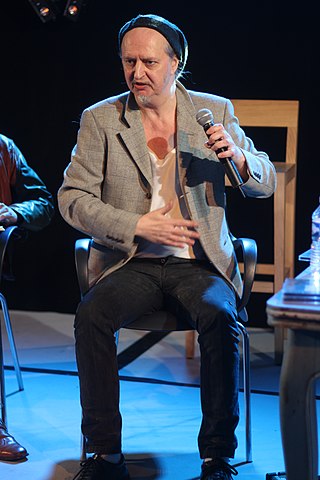
Nick Kent is a British rock critic best known for his writing for the NME in the 1970s, and his books The Dark Stuff (1994) and Apathy for the Devil (2010).
Shock rock is the combination of rock music or heavy metal music with highly theatrical live performances emphasizing shock value. Performances may include violent or provocative behavior from the artists, the use of attention-grabbing imagery such as costumes, masks, or face paint, or special effects such as pyrotechnics or fake blood. Shock rock also often includes elements of horror.
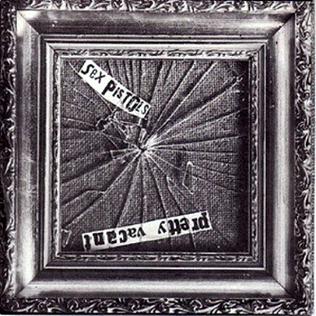
"Pretty Vacant" is a song by the English punk rock band the Sex Pistols. It was released on 2 July 1977 as the band's third single and was later featured on their only album, Never Mind the Bollocks, Here's the Sex Pistols, released during that same year. It is the first song written by the band.

Jon Savage is an English writer, broadcaster and music journalist, best known for his definitive history of the Sex Pistols and punk music, England's Dreaming (1991).
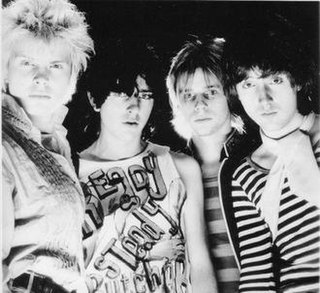
Generation X were an English punk rock band, formed in London in 1976. They were the musical starting point of the career of their frontman Billy Idol, and issued six singles that made the UK Singles Chart and two albums that reached the UK Albums Chart.

Sounds was a UK weekly pop/rock music newspaper, published from 10 October 1970 to 6 April 1991. It was known for giving away posters in the centre of the paper and later for covering heavy metal and punk and Oi! music in its late 1970s–early 1980s heyday.
Sex was a boutique run by Vivienne Westwood and her then partner Malcolm McLaren at 430 King's Road, London between 1974 and 1976. It specialised in clothing that defined the look of the punk movement.
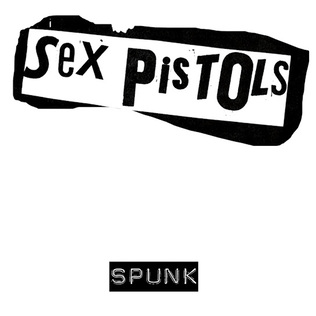
Spunk is a bootleg demo album by the English punk rock band The Sex Pistols. It was originally released in the United Kingdom during September or October 1977.

The history of the punk subculture involves the history of punk rock, the history of various punk ideologies, punk fashion, punk visual art, punk literature, dance, and punk film. Since emerging in the United States, the United Kingdom and Australia in the mid-1970s, the punk subculture has spread around the globe and evolved into a number of different forms. The history of punk plays an important part in the history of subcultures in the 20th century.
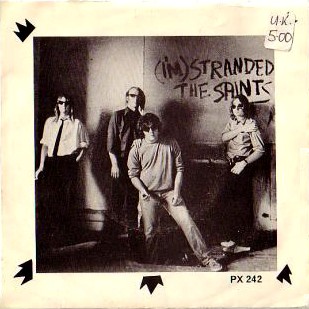
"(I'm) Stranded" is the debut single released by Australian punk rock band the Saints. Issued in September 1976, it has been cited as "one of the iconic singles of the era", and pre-dated vinyl debuts by contemporary punk acts such as the Sex Pistols, Buzzcocks, The Damned and The Clash. In 2001, it was voted among the Top 30 Australian Songs of all time by APRA.

Spiral Scratch is an EP and the first release by the English punk rock band Buzzcocks. It was released on 29 January 1977. It is one of the earliest releases by a British punk band. The EP is the only Buzzcocks studio release with original singer Howard Devoto, who left shortly after its release to form one of the first post-punk bands, Magazine.
Post-punk is a broad genre of rock music that emerged in the late 1970s in the wake of punk rock. Post-punk musicians departed from punk's traditional elements and raw simplicity, instead adopting a broader, more experimental approach that encompassed a variety of avant-garde sensibilities and non-rock influences. Inspired by punk's energy and do it yourself ethic but determined to break from rock cliches, artists experimented with styles like funk, electronic music, jazz, and dance music; the production techniques of dub and disco; and ideas from art and politics, including critical theory, modernist art, cinema and literature. These communities produced independent record labels, visual art, multimedia performances and fanzines.
Anthology Recordings is the reissue imprint of the independent record label, Mexican Summer. The label was originally founded by Mexican Summer A&R man, Keith Abrahamsson, in 2004, and has reissued records from artists such as Trad Gras Och Stenar, Linda Perhacs, and Rüdiger Lorenz, among others.
Catherine Simon is an American portrait photographer and writer. She is known for her photographs of influential musicians, artists, and writers, including The Clash, Patti Smith, Madonna, Andy Warhol, and William S. Burroughs. One of her photographs of Bob Marley was used on the front cover of his 1978 album, Kaya.
Gavin Martin was a globally celebrated Northern Irish music journalist.











